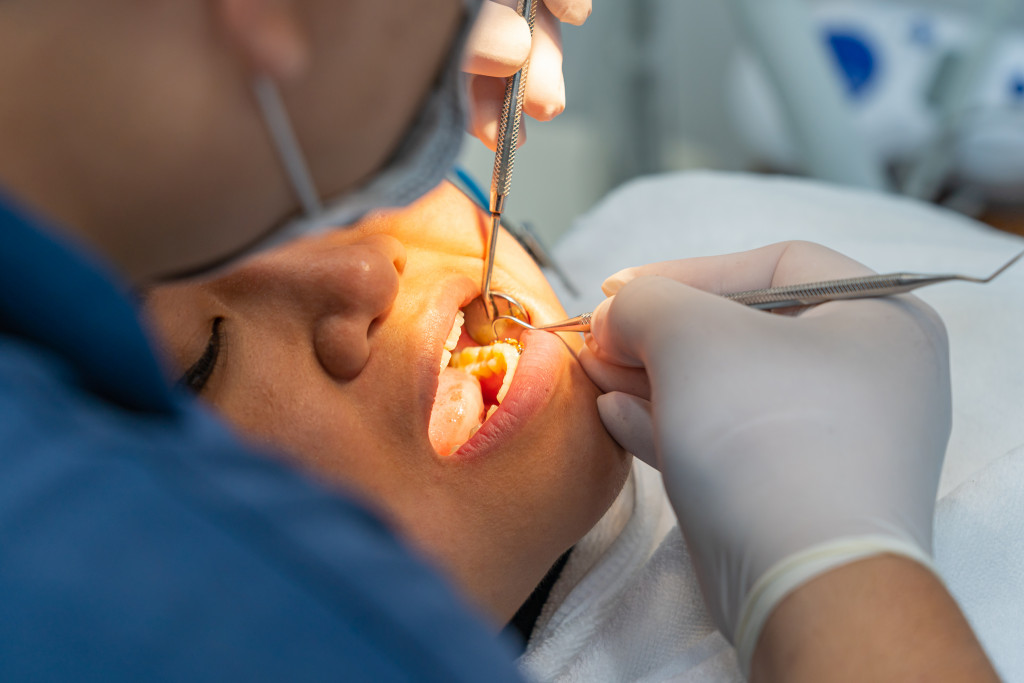Did you know that over half of Americans suffer from gum disease? 47.2%, to be exact, which totals around 64.7 million people. And it only gets worse with age; 70.1% of adults aged 65 or older have at least mild gum disease, if not worse. Gum disease is an infection of the gums that can lead to tooth loss, bone loss, and other serious health problems. Despite its prevalence, gum disease is often ignored or left untreated. This is a mistake!
Symptoms of Gum Disease
First, you must recognize gum disease’s symptoms and seek treatment. Symptoms can include:
- Red, swollen, tender gums
- Bleeding while brushing or flossing
- Receding gums
- Persistent bad breath
- Loose teeth
The infection is known as gingivitis at the early stage, and it can be reversed with proper care. If left untreated, however, the infection will progress to periodontitis which cannot be reversed and must be managed with ongoing treatments. Ignoring gum disease can lead to serious health problems, such as the following:
Tooth Loss
The most obvious risk associated with gum disease is tooth loss. Gum disease causes the gums to pull away from the teeth, creating pockets of bacteria. These pockets eventually become infected, causing the bone around the teeth to deteriorate. This process can lead to tooth loss if left untreated. Tooth loss starts when the supporting bone structure around the teeth is destroyed.
What to Do: Tooth loss is, unfortunately, irreversible. What you can do now is to see your dentist for implants. If you’ve lost four teeth due to gum disease, implants on all four teeth can help restore your bite and prevent further tooth loss. This can save you from having to wear dentures or other dental appliances in the future. This is done by placing metal implants into the jawbone and attaching a replacement tooth. This is more cosmetic than dentures, as implants better mimic real teeth.
Heart Disease
Gum disease has been linked to heart disease, stroke, and other cardiovascular diseases. This is thought to be due to the bacteria that enter the bloodstream when you have gum disease. The bacteria can cause inflammation in your arteries, leading to blockages that could result in a heart attack or stroke.
What to Do: If you already have gum disease, getting it treated as soon as possible is important. This is especially true if you’re at risk for heart disease or other cardiovascular diseases. Your dentist can help diagnose the level of infection and recommend an appropriate treatment plan. It’s also important to ensure you practice good oral hygiene habits daily and visit your dentist regularly for check-ups.

Diabetes Complications
Gum disease has also been linked to diabetes complications. People with diabetes are more likely to get gum disease, and those with gum disease are more likely to struggle with controlling their blood sugar levels. Also, an infection like periodontitis could make your blood sugar level increase and, as a result, makes it more complicated to manage your diabetes.
What to Do: If you have diabetes, you must see your dentist regularly for check-ups and cleanings. This helps prevent gum disease from developing or getting worse. You should also practice good oral hygiene habits daily and watch for signs of gum disease, such as redness, swelling, and bleeding of the gums. If you experience these signs, see your dentist immediately for treatment.
Taking Care of Your Gums
The good news is that gum disease can be avoided by taking proper care of your gums. Here are some tips on how you can avoid the risks of gum disease:
- Brush at least twice a day with fluoride toothpaste
- Floss at least once daily
- Eat a healthy, balanced diet
- Visit your dentist for regular check-ups and cleanings
- Stop smoking or using any other form of tobacco
If you’re already experiencing symptoms of gum disease, it’s important to seek treatment from your dentist as soon as possible. Treatment for gum disease depends on its severity and can range from professional cleaning to surgery. The sooner you see your dentist, the better your chances of saving your teeth and avoiding other potential health risks.
What Your Dentist Can Do
Your dentist is the best person to help you manage your gum disease. They can diagnose your condition and recommend a course of treatment, which may include professional cleaning, antibiotics, surgery, or other treatments. Your dentist can also provide lifestyle advice and tips on how to reduce the risk of developing gum disease in the future. By visiting your dentist every six months for check-ups and cleanings, you can catch any signs of gum disease before it becomes a bigger problem.
Gum disease is a serious problem that should not be ignored. Ignoring gum disease can lead to tooth loss, cardiovascular disease, and diabetes. If you suspect gum disease, you must see a dentist as soon as possible. Early diagnosis and treatment can help improve your overall health and prevent further complications.

